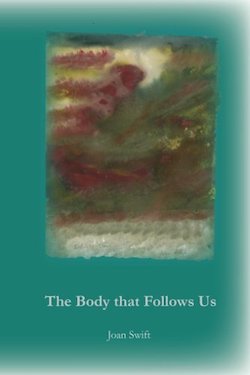Literary Event of the Week: Celebrating the life and work of Joan Swift
It was a loss that felt like the fluttering turn of a page. When Seattle-area poet Joan Swift passed away back in March, friends and fans expressed their grief in many ways. They shared stories about Swift’s generosity of spirit, her candor as an artist, and her tireless devotion to the craft. But the most common sentiment, the one shared by people who spent years with Swift in their lives and by people who had never once met her, was that Swift’s passing was a sad and significant moment in Seattle literary history, a loss of generational proportions.

This Tuesday, May 16th at 7 pm, Open Books is hosting a memorial service and celebration of Swift’s work. Local writers including Tess Gallagher, Esther Atshul Helfgott, and Holly Hughes will be on hand to talk about their memories of Swift, and fans are encouraged to bring a favorite poem to share with the audience. Cave Moon Press publisher Doug Johnson will be hosting the event, and debuting Swift’s final collection, The Body That Follows Us, which she completed just before she passed. The event should serve as a good introduction to Swift’s work for people who’d like to know her better and a fond farewell for those who know her well.
At 90 years old, Swift was loved by a cross-section of Seattle writers that stretched back to the roots of modern Northwest literature. She was one of the last living writers to take Seattle poetry godfather Theodore Roethke’s class, and she provided a direct link to future generations of writers.
Swift inspired with her presence; poet Esther Atshul Helfgott, who founded the It’s About Time open mic series, says Swift read at her reading many times. She says Swift “treated me like an equal,” even though most “writers of Joan’s caliber wouldn’t give us a second look.”
And Swift also inspired by her example. She published poems about her own experiences with rape and her daughter’s suicide that to this day stun readers with their candor and bravery. Her work was intelligent and well-crafted, but she wasn’t genteel; when the subject called for it, she used language and subject matter that was sometimes shocking.
Shortly after news of Swift’s death broke, Sherman Alexie told me about the impact that Swift’s work had on him as a young poet. “I read a Joan Swift poem about eagles having sex as they plummet toward the earth, how they sometimes forget to uncouple and crash to their deaths,” Alexie says. “And I remember thinking, ‘Wait, it’s cool to write a poem about eagles fucking to death? Awesome!’ Joan introduced a new rule of poetry to me. Or broke the old rules. Or both.”
This week, Small Press Distribution released their list of poetry bestsellers for the month of April 2017. In the top ten bestselling poetry books around the nation, you’ll find three young Seattle-area poets: Robert Lashley, Jane Wong, and Sarah Galvin. As the vanguard of our city’s literary scene, they’re building on the foundation that Joan Swift helped establish. Swift’s legacy is more than secure — it’s thriving.